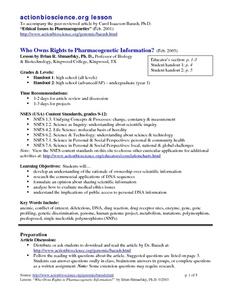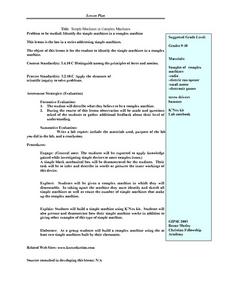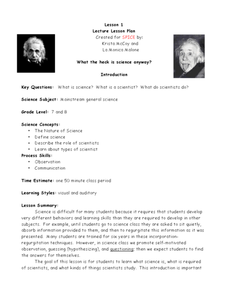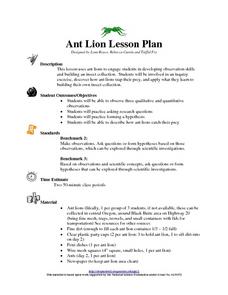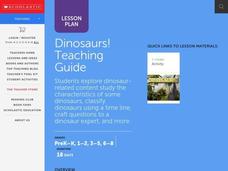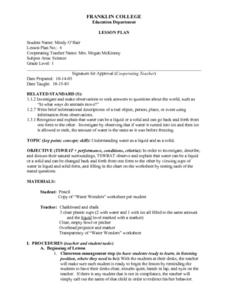Curated OER
Radiation Reassessed
Young scholars investigate the dangers of radiation by exploring recent nuclear tragedies. In this scientific debate activity, students define the idea of radiation "half life" and determine if low doses of radiation are truly damaging...
Curated OER
The Battle of Stones River: The Soldiers' Story
Learners organize items in a "doohickey kit" distributed by the teachers, creating categories using classification schemes. In this classification activity, learners compare systems within groups and write questions that could be...
Curated OER
Who Owns Rights to Pharmacogenetic Information?
Students develop an understanding of the rationale of ownership over scientific information. They research commercial applications of DNA sequences. They analyze how to evaluate medical ethics issues.
Curated OER
Science Lab Skills
Learners develop problem solving, decision-making and inquiry skills by planning experiments. They conduct systematic observations, interpret and analyze data and draw conclusions then communicate their results.
Curated OER
The Solar System: Why do we Explore?
Third graders act as scientists. In this property discovery lesson, 3rd graders explore the substance "Oobleck" (cornstarch, water, food coloring). They work in groups to investigate the substance and make observations as a scientist...
Curated OER
Simple Machines In Complex Machines
Students brainstorm the concept of a machine. They make lists of the characteristics that all machines share. The teacher uses questioning in order to get students to think more deeply about the subject. They create a lab to demonstrate...
Alabama Learning Exchange
Air is All Around You
Pupils investigate the mysteries of air. In this science lesson, students participate in hands-on activities that require them to use the scientific inquiry model to study air.
Curated OER
As a Matter of Fact
Elementary-aged scientists discover that all matter has mass. They are shown the difference between mass and weight, and learn how to calculate mass using the appropriate tools and methods. The scientific method is used while estimating...
Science 4 Inquiry
The Ins and Outs of Photosynthesis
The most important chemical process on Earth is photosynthesis. Scholars explore the changes in the gases in our atmosphere as life on Earth developed. They create a model of photosynthesis and consider simple questions.
Monroe City Schools
Clouds! Clouds! Clouds!
Here is a beautiful lesson on clouds designed for your 1st graders. Learners study three different types of clouds. They construct drawings of cumulus, cirrus, and stratus clouds. The Cloud Book, by Tommie dePaola is used to introduce...
California Academy of Science
What Would Happen?
Nothing says classroom fun like an invertebrate and a magnifying glass! Snails, earthworms, and roly-poly bugs become the center of attention as pint-sized investigators hone their inquiry and observation skills. They are guided through...
Curated OER
What the Heck Is Science Anyway?
Here is a 12-page outline of an introductory science lesson. The teacher lectures on what science is, the role of a scientists, different disciplines of science, and the impact of scientific discoveries. Detailed lecture notes are...
NASA
A Different Perspective
What can we learn from the data? Young scholars analyze actual solar data to answer specific questions. The activity presents an opportunity for an open-ended investigation of the data to conclude a five-part series on solar winds.
University of California
Hot! Hot! Hot!
Calories are not tiny creatures that sew your clothes tighter every night, but what are they? A science activity, presented at multiple levels, has learners experiment with heat, heat transfer, and graph the function over time. It also...
Texas State Energy Conservation Office
Investigation: Insulation
Youngsters compare the heat-holding abilities of three different cans by insulating two with different materials and measuring the temperature change of hot water over a 20-minute period.
American Chemical Society
Development of Baking Powder
Did you know baking powder can be used to treat acne, whiten teeth, and make sugar cookies? The lesson plan on the development of baking powder is ready-to-go with no preparation required. Through readings, pupils answer questions,...
American Chemical Society
The Discovery of Fullerenes
Carbon is the most common element on earth, so the innovative discovery of a new type of carbon molecule won the 1996 Nobel Prize. In the ready-to-go lesson, scholars learn about C60 and how it has opened up the entire area of...
Curated OER
Ant Lion Lesson Plan
Students observe three qualitative and quantitative observations. The students further practice the follwoing: asking research questions,forming a hypothesis, and describe how ant lions catch their prey. Students also form hypotheses...
Curated OER
Classification in Action
Students work with a set of objects to set up both quantitative and qualitative classification systems. As a group, students follow an example to design and complete two classification systems using a set of objects provided. ...
Curated OER
Dinosaurs
Students will develop goals for inquiry. They will also improve content area reading and research skills. The context of studying dinosaurs will help learners to distinguish from organisms that live presently and those from the past...
Curated OER
What Is The Matter?
Students engage in a lesson about the scientific concept of matter. They use essential questions in order to guide the research process. Students engage in several class inquiries that are hands on in order to investigate the properties...
Curated OER
Water - Solid and Liquid
First graders conduct a science inquiry by comparing water in its liquid and solid form. The students describe the different stages of water and complete a worksheet answering questions about each form of the water. Teacher assessment...
Curated OER
Galactic Inquiry
Young scholars view NASA images of galaxies and develop a galaxy classification scheme. They compare and contrast their classification scheme with that developed by Edwin Hubble. They recognize that galaxies are collections of billions...
Curated OER
Ozone Hole Expert Groups
Research topics associated with the hole in the ozone layer over Antarctica. Researchers write five facts about their topic and one question for each of those facts. They present what they learned to the rest of the class. Six topics are...




